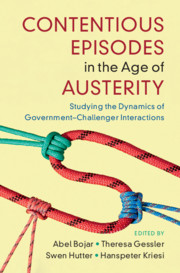 Contentious Episodes in the Age of Austerity
Contentious Episodes in the Age of Austerity Book contents
- Contentious Episodes in the Age of Austerity
- Cambridge Studies in Contentious Politics
- Contentious Episodes in the Age of Austerity
- Copyright page
- Contents
- Figures
- Tables
- Contributors
- Preface
- Part I A New Approach to the Analysis of Contentious Episodes
- Part II Varieties of Contention
- Part III Dynamics of Interaction
- 8 Interaction Dynamics in Contentious Episodes: Path-Dependence, Tit-for-Tat, and Constructive Mediation
- 9 The Governments’ Reactions to Challengers and Third Parties
- 10 The Effect of Repression on Protest
- 11 Turning Points
- 12 The Greek Case
- Part IV Conclusion
- Appendices
- References
- Index
- Series page
8 - Interaction Dynamics in Contentious Episodes: Path-Dependence, Tit-for-Tat, and Constructive Mediation
from Part III - Dynamics of Interaction
Published online by Cambridge University Press: 05 November 2021
- Contentious Episodes in the Age of Austerity
- Cambridge Studies in Contentious Politics
- Contentious Episodes in the Age of Austerity
- Copyright page
- Contents
- Figures
- Tables
- Contributors
- Preface
- Part I A New Approach to the Analysis of Contentious Episodes
- Part II Varieties of Contention
- Part III Dynamics of Interaction
- 8 Interaction Dynamics in Contentious Episodes: Path-Dependence, Tit-for-Tat, and Constructive Mediation
- 9 The Governments’ Reactions to Challengers and Third Parties
- 10 The Effect of Repression on Protest
- 11 Turning Points
- 12 The Greek Case
- Part IV Conclusion
- Appendices
- References
- Index
- Series page
Summary
In the introductory chapter of this volume, we presented our case for studying interaction dynamics between governments, challengers, and third-parties in the “middle ground” because we share Tilly’s (2008: 21) view that this level of analysis offers the “opportunity to look inside contentious performances and discern their dynamics” without losing the opportunity to systematically analyze these dynamics in a quantitative framework. In this present chapter, we further develop this middle ground by presenting a novel method for studying these interaction dynamics. We concur with Moore (2000) that most of the literature on the interaction between governments and challengers is based on cross-sectional analyses using national, aggregate yearly data, which is fundamentally inappropriate for the questions raised about the interactions we were studying. To deal with such questions, we need sequential data that allows us to specify how the different actors react to each others’ previous actions. Such sequential data not only allows us to causally connect all the actions constituting an episode as we have done in Chapter 6, but it also permits us to take a step further and uncover regularities that occur in the interaction between the protagonists of the conflict. Drawing on the construction of action sequences from Chapter 6, we now focus on the relationship between actions and their triggers and examine some of the main themes and mechanisms in the literature on contention politics through this novel methodological lens. In other words, we shall take the mechanism-centered approach from the narrative tradition and marry it with some of the basic tools of time-series methodology to infuse it with statistical rigor. This, in essence, is the dynamic aspect of Contentious Politics Analysis that we put forward in this volume.
Information
- Type
- Chapter
- Information
- Contentious Episodes in the Age of AusterityStudying the Dynamics of Government–Challenger Interactions, pp. 147 - 165Publisher: Cambridge University PressPrint publication year: 2021